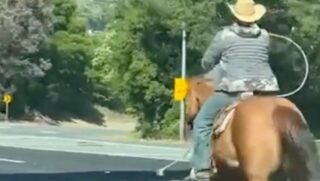Most people probably never heard of Fair Oaks Farms on Monday. A short work week later and suddenly a lot of new people know all about Fair Oaks Farms. That’s because an animal-rights organization released footage from the Indiana farm allegedly showing a handful of employees engaging in some pretty gruesome animal abuse.
I’ll admit that I haven’t watched the video. I can’t. I know it has to do with some calves. And someone stomping their feet. That’s really more than I can stomach. So I won’t watch it.
And why would I? I don’t watch videos of child abuse. I’m not going to watch the same thing happening to helpless animals. I love animals. I’m a proud fur mom (#FurMomsAreRealMoms). And I have no tolerance for anyone treating animals with less dignity and respect than they deserve, especially farm animals.
So let’s be clear: I’m not defending what happened in that video. I’m not going to excuse what happened in that video. I understand it was horrendous. And, quite frankly, people who contributed to the cruelty should be prosecuted.
Yet I understand that farmers feel like they need some type of protection from the angry mobs now threatening and hounding Fair Oaks. Those farmers have released multiple statements and videos. They say they didn’t know it was happening. They certainly didn’t condone it. And most of the employees who were filmed were fired long ago (a fourth was fired this week).
But it turns out an animal-rights organization was involved in the whole affair. Animal Recovery Mission (ARM) is basically some vigilante who goes around doing “investigative” work trying to expose animal cruelty. ARM claims it’s a groundbreaking organization that puts together compelling evidence of animal cruelty to help aid in prosecutions.
Here’s what we know though. Animal-rights groups hire individuals to work at farms and go undercover. These groups also have been known to fabricate video narratives to suit their goals, and sometimes they knowingly mislabel legitimate animal-husbandry practices as abuse. And then the videos get released, usually to further a radical agenda.
How do we know? Because the videos are only shared on social media. No one calls law enforcement. No one reports it to a supervisor. They post it online because they want to tug at your heartstrings and convince you to give up animal products.
And because we know some of these videos are deceptively created and promoted, farmers also want to know what they can do to stop it. Legally, what are our options?
We’ve tried the so-called ag-gag laws. Those laws prohibit people from coming on farms undercover or illegally and taking videos. They make sense, and I fully support them. But for every state that passes one, another court knocks it down. So far they haven’t been much help.
Another option is imposing a duty on witnesses of animal abuse to report to authorities. On the face this also makes sense. Grab a quick video for proof if you want, but don’t just post it to social media. Report the abuse to the police or, at the very least, someone in charge at the operation. Make sure the abusive person is held accountable.
Generally, the law doesn’t impose any affirmative duties on us. When we take action, and do that action poorly, we can get in trouble. But we aren’t required to do anything. So for example, if you see a toddler on the train tracks, you don’t have a duty to move the child. Yes, morally you should probably move the child (and perhaps make sure the toddler isn’t out wandering around alone). And you have to take care when moving the child. Because you’re likely going to get in trouble if you move the child by kicking him or her off the tracks. But there’s no criminal penalty if you don’t move the kid.
So imposing an affirmative duty to report animal abuse would be somewhat of a legal exception. I see the appeal, and it has merit. But we really should be careful about adopting this approach.
A criminal statute needs a penalty. And do we really want to throw someone in jail or impose a big fine just because they didn’t report animal abuse? How do we define abuse? And how does an average person with no animal-husbandry experience know what constitutes abuse?
Don’t get me wrong: If you see someone abusing an animal, you definitely need to tell someone. And farm employees should be encouraged to report any abuse to supervisors or the authorities. But I’d rather make that an internal policy that farms encourage and enforce. Farmers should bear the burden of protecting animals’ quality of life, not the general public.
A reasonable middle ground has been adopted by several states. That is, veterinarians, care providers, and certain social workers have a responsibility to report animal abuse when they encounter it. And, quite frankly, these are the folks most likely to properly identify abuse and know what to do. The American Veterinary Medical Association has a list of those states and their laws here.
My best (non-legal) advice to farmers. Vet your prospective employees thoroughly. Make sure your animal-care rules are clear and explained to employees. Monitor and supervise employees frequently. And take accusations seriously.
It also doesn’t hurt to train employees to recognize the signs of animal abuse. We frequently train scout leaders, teachers, and other people who work with children to spot the signs of abuse. Developing and implementing similar programs for animal caretakers could go a long way.
We’ll never weed out all evil people. But we definitely have a duty to try.
Amanda Zaluckyj blogs under the name The Farmer’s Daughter USA. Her goal is to promote farmers and tackle the misinformation swirling around the U.S. food industry.



